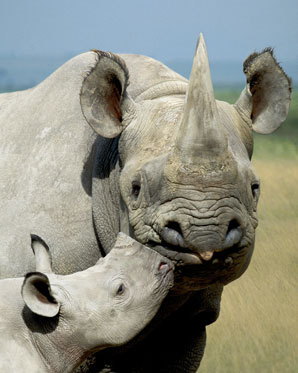Rhino killing on rise in South Africa
 0 Comment(s)
0 Comment(s) Print
Print E-mail
China.org.cn, July 5, 2011
E-mail
China.org.cn, July 5, 2011
Nearly 200 rhinos have been killed in South Africa during the first half of the year, which has the world's largest population of the animals, said WWF International, the conservation group.

The rate of poaching if not curbed could exceed 2010 levels when a record 333 rhinos were killed in the country.
South Africa has lost at least 193 rhinos during the first six months of 2011 with Kruger National Park continuing to be hardest hit. The world famous safari destination has already lost 126 rhinos to poaching this year in addition to 146 killed there in 2010.
"Poaching is being undertaken almost without exception by sophisticated criminals, sometimes hunting from helicopters and using automatic weapons," says Dr. Joseph Okori, WWF's African Rhino Programme Coordinator. "South Africa is fighting a war against organized crime that risks reversing the outstanding conservation gains it made over the past century."
South Africa is home to the largest populations of African rhinos, including white rhinos and critically endangered black rhinos.
In response to the recent poaching crisis, law enforcement measures have been increased resulting in 123 arrests and six successful convictions so far in 2011. Last year South African authorities arrested a total of 165 suspected poachers and convicted four. Judicial proceedings are ongoing for many of the suspects.
"We are pleased to see more successful convictions of poachers," said Dr. Morné du Plessis, CEO of WWF South Africa. "Applying strict penalties for wildlife crimes such as rhino poaching will demonstrate the South African government's commitment to maintaining this important part of the country's heritage." In June, neighbouring Swaziland lost its first rhino to poaching in nearly 20 years sparking fears that the crime wave could be spreading. Authorities in Swaziland arrested three suspects within days of the killing, but have since released them on bail.
WWF opposes the granting of bail to poaching suspects due to the gravity of their crimes and their high flight risk. Suspects at large continue to pose a threat to rhinos and can cause delays to judicial proceedings.
"We cannot allow poaching to proliferate across rhino range countries," Dr. Okori says. "Swift prosecutions of wildlife crimes and strict sentences for perpetrators will serve as a deterrent to potential criminals. Poachers should be shown no leniency."
Rhino poaching is being fueled by demand for horns in Asia, where they are highly valued for traditional medicine, although rhino horn has no scientifically proven healing properties.
"The poaching surge shows no sign of abating," says Tom Milliken, Elephant & Rhino Programme Coordinator with TRAFFIC, the wildlife trade monitoring group. "Only a concerted international enforcement pincer movement, at both ends of the supply and demand chain, can hope to nip this rhino poaching crisis in the bud."





